June 1, 2025 | 20:47 GMT +7
June 1, 2025 | 20:47 GMT +7
Hotline: 0913.378.918
June 1, 2025 | 20:47 GMT +7
Hotline: 0913.378.918
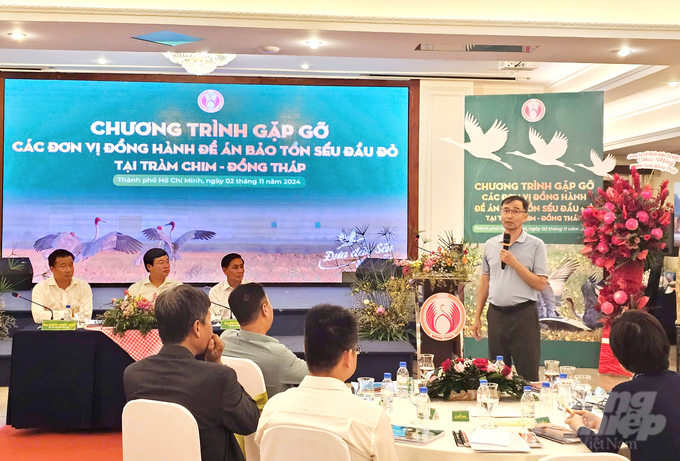
The Dong Thap Provincial People's Committee recently held a meeting with partners involved in the red-crowned crane conservation project at Tram Chim National Park. Photo: Le Hoang Vu.
The Dong Thap Provincial People's Committee recently held a meeting with partners involved in the red-crowned crane conservation project at Tram Chim National Park. During the meeting, Secretary of the Dong Thap Provincial Party Committee, Mr. Le Quoc Phong, expressed his hope that the red-crowned cranes would soon return to Dong Thap, seeing it as their familiar home.
The red-crowned crane is a sacred and rare bird listed in the world’s Redlist. For Vietnamese people, cranes, also known as "hạc", symbolize strength, longevity, and fidelity. Vietnam is one of the few Southeast Asian countries where red-crowned cranes choose to reside. In 1988, 1,052 red-crowned cranes migrated to Tram Chim National Park (Tam Nong District). However, this number has significantly declined over time, with an annual average of 33 individuals from 2013 to 2020, only three cranes returning in 2021, and just four this year.
Secretary Le Quoc Phong noted that 2024 would mark the return of many bird species to Tram Chim National Park. He saw the return of four cranes this year as a promising sign of the ecosystem’s recovery.
To the people of Dong Thap, each season that cranes return brings good fortune and is a sign of nature’s balance, bringing joy to locals and visitors alike. "This inspires managers to push forward with the red-crowned crane conservation project, ensuring the cranes return to Dong Thap and thrive as if finding their old, familiar home", said Mr. Phong.

Secretary Le Quoc Phong expects the return of many bird species including cranes to Tram Chim National Park. Photo: Le Hoang Vu.
The project is a long-term endeavor, aiming to restore habitats to attract hundreds of cranes back to Tram Chim within 10 years. This requires strategic management and conservation efforts from those responsible for the park.
Mr. Phong hopes Dong Thap residents will see crane conservation as their own mission, treating the cranes as friends or family. He also emphasized the need for sustainable rice farming practices, transitioning to organic farming with corporate support. The Secretary called on organizations, individuals, and businesses to join in the 10-year journey of the project.
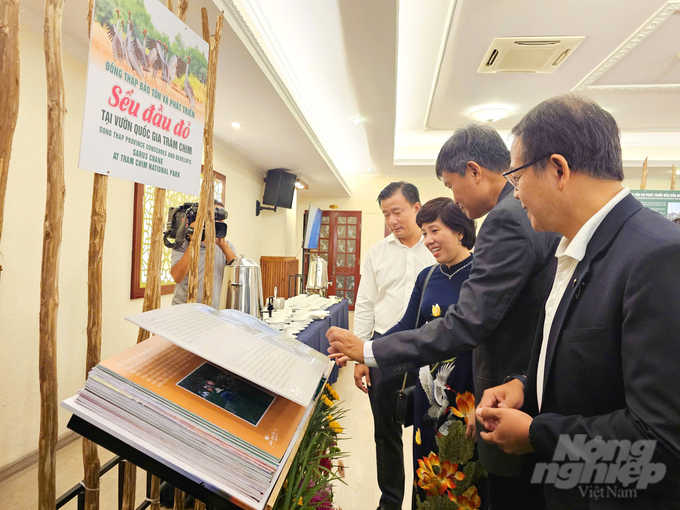
People in Dong Thap province view red-crowned cranes protection as a personal responsibility. Photo: Le Hoang Vu.
According to Mr. Tran Triet, Director of the Southeast Asia Crane Conservation Program at the International Crane Foundation, the project isn't just about conserving cranes but also restoring the Dong Thap Muoi wetlands’ unique ecosystem. This is the most crucial goal for Dong Thap, the Mekong Delta, and the entire nation.
Mr. Nguyen Phuoc Thien, Vice Chairman of the Dong Thap Provincial People’s Committee, stated that support from local and international organizations is a driving force behind the province’s determination to achieve the project’s objectives. From 2022 to 2032, the province plans to collaborate with Thailand to reintroduce 100 cranes, aiming for at least 50 to survive, reproduce, and adapt to life in Tram Chim.
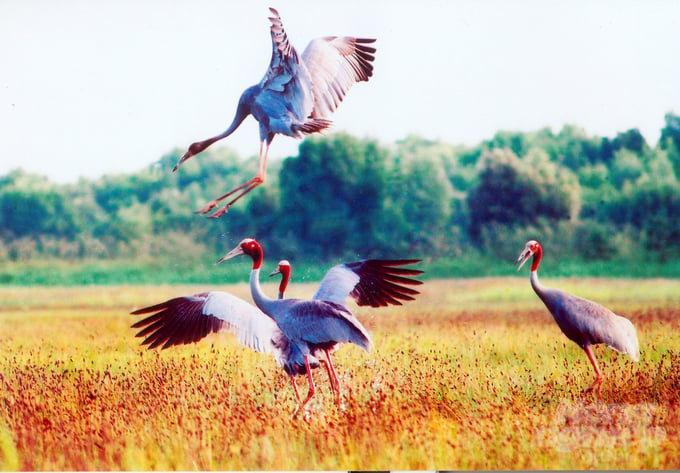
From 2022 to 2028, Dong Thap province aims to receive approximately 30 six-month-old cranes from Thailand, raise and release them into the wild. Photo: TCNP.
From 2022 to 2028, Dong Thap province aims to receive approximately 30 six-month-old cranes from Thailand, raise and release them into the wild. During this period, 200 hectares of farmland will be converted to ecological rice farming, with an emphasis on organic practices in areas surrounding Tam Nong District.
Between 2029 and 2032, the province will negotiate with Thailand to acquire an additional 30 cranes, aiming to raise and reproduce about 40 offspring from the initial population. Plans include mapping crane habitats inside and outside Tram Chim National Park. The total project cost is estimated at nearly VND 185 billion.
Translated by Kieu Chi
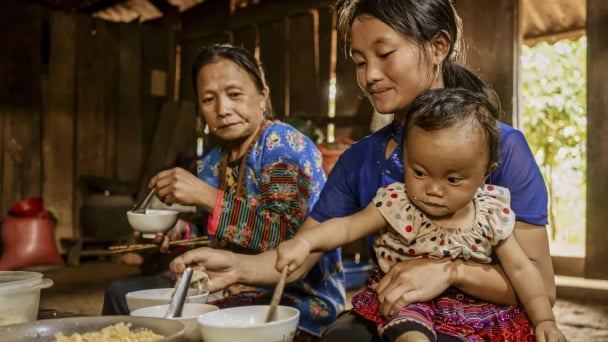
(VAN) 30 experts in health, agriculture and environment participated in a consultation workshop to inform the development of a methodological framework aimed at supporting Vietnam’s transition to a sustainable food system.
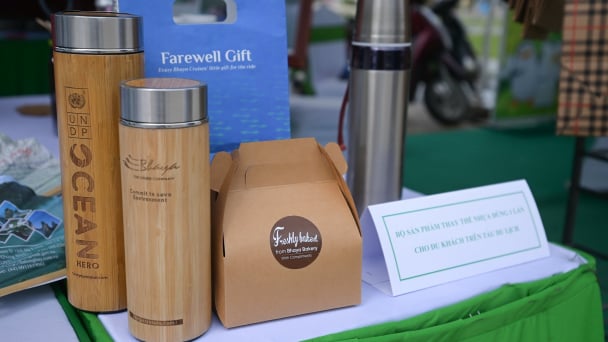
(VAN) Over the past five years, Quang Ninh Province has vigorously and synchronously implemented the ‘Say No to Plastic Waste’ campaign, yielding positive outcomes in advancing sustainable tourism.

(VAN) The prevention of plastic pollution necessitates collaboration among governments, businesses, and citizens. Today's little things contribute to a future free of plastic.

(VAN) This was the directive given by Deputy Minister Phung Duc Tien during a meeting with the Department of Livestock Production and Animal Health, and relevant stakeholders to prevent and control African swine fever.
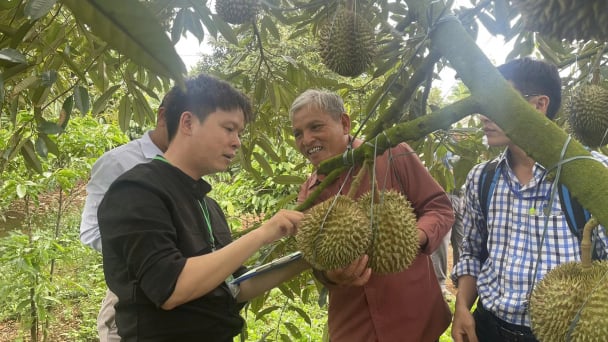
(VAN) For the durian industry to succeed, the value chain must fulfill its commitments to the government, the community, and international partners.

(VAN) Vaccinating juvenile pangasius helps reduce disease, antibiotic use, and farming costs, increasing profits for export-oriented farmers in An Giang.

(VAN) Due to a limited supply of workforce and competitive recruitment requirements, businesses struggle to retain talented veterinary human resources.